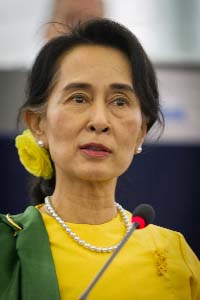
AFP, Yangon :
Myanmar’s opposition has gathered millions of signatures in support of changes to a constitution that bars its leader Aung San SuuKyi from becoming president, in a show of political strength ahead of elections next year.
Suu Kyi has travelled the country drawing crowds of thousands with speeches urging the military to accept a reduced political role, as her party of democracy veterans touts its moral authority in the former army-run nation.
The petition, which was launched in May, had gathered around three million signatures by early July.
“In a democratic country the people’s will is important. That is why this is important,” Nyan Win, a spokesman for Suu Kyi’s National League for Democracy (NLD) party, told AFP.
The campaign, which ends on Saturday, is focused on altering a provision that currently ensures the military has a veto on any amendment to the junta-era charter.
To alter the constitution there needs to be support from a majority of over 75 per cent of parliament.
Unelected soldiers, who make up a quarter of the legislature, therefore, have the last say on changes to the charter.
Nyan Win said he expects the clause to be altered during the current sitting of parliament, which ends later this month, and that this would enable further changes.
“It is the main door. If it opens, you’ll see everything,” he said. While the campaign has generated headlines, experts say it is unclear what effect it will have.
A member of the constitution amendment committee, which like parliament is dominated by the military and ruling army-backed party, said the petition would make no difference to its deliberations.
He said the 31-member group will release its first recommendations in the coming days, but that these are only based on suggestions received before a December deadline.
“They should have done this earlier,” he told AFP on condition of anonymity because members have been directed not to reveal their deliberations.
It is believed the committee has already decided not to recommend a change to the controversial provision that currently bars Suu Kyi from becoming president.
Myanmar’s 2008 charter blocks anyone whose spouse or children are overseas citizens from leading the country – a clause widely believed to be targeted at the Nobel laureate, whose two sons are British.
Suu Kyi spent most of two decades locked up under the junta, but now joins former generals in parliament as an MP, thanks to reforms by a quasi-civilian government that took power in 2011.
She has urged soldiers to support the petition. “I would like you all to consider whether getting more opportunities than ordinary citizens is really fair,” she told a rally in Yangon in May, earning a rebuke from the country’s election commission.
Derek Tonkin, a former British ambassador to several Southeast Asian countries, said Suu Kyi is “desperately disappointed” by the committee’s lack of support and could even consider pulling out of the election if she feels constitution reform falls short.

